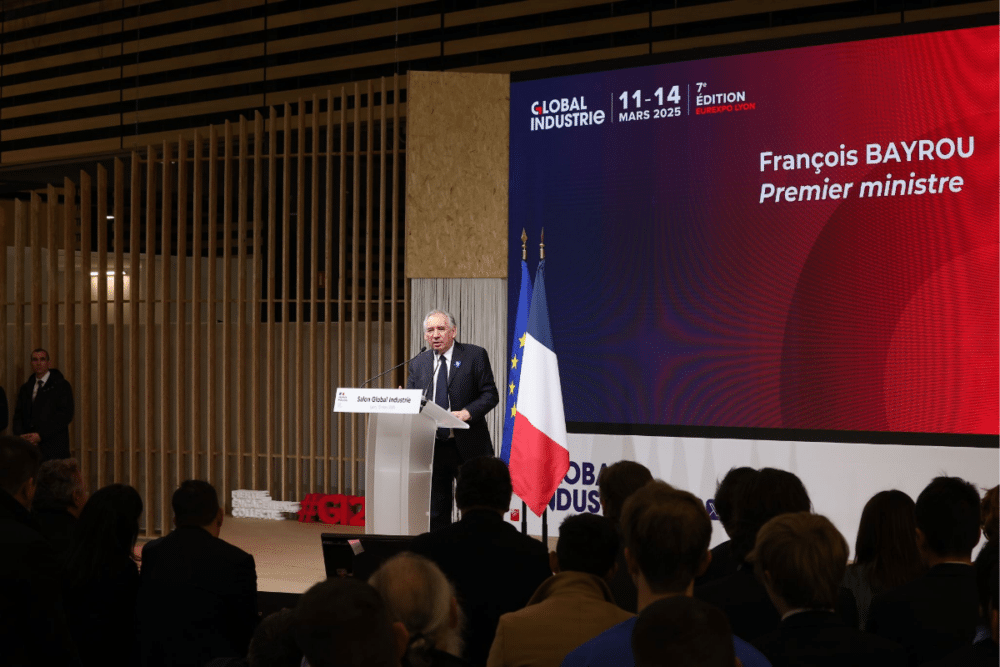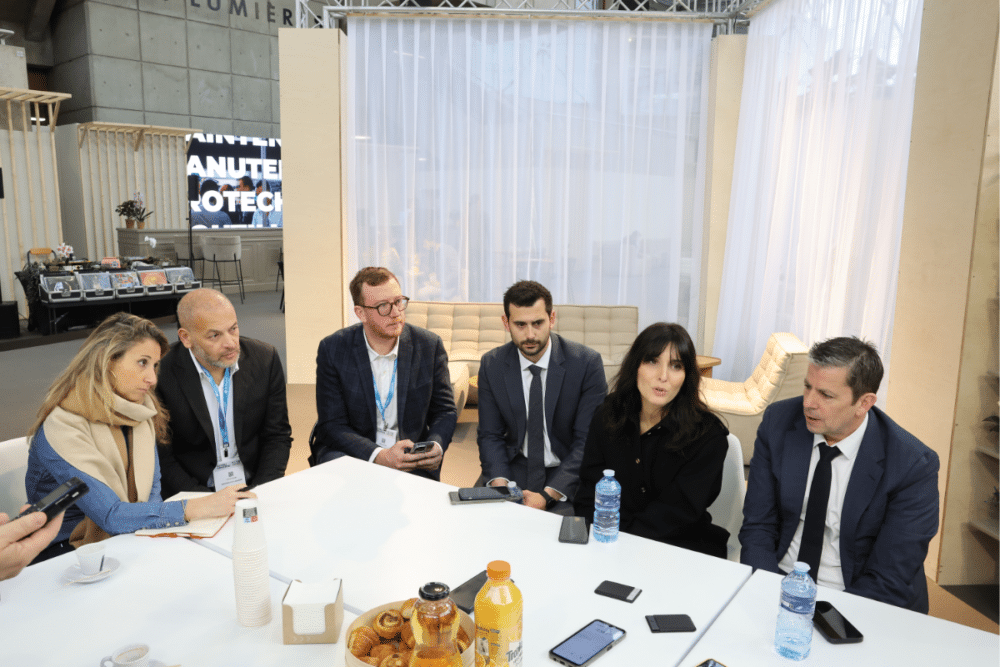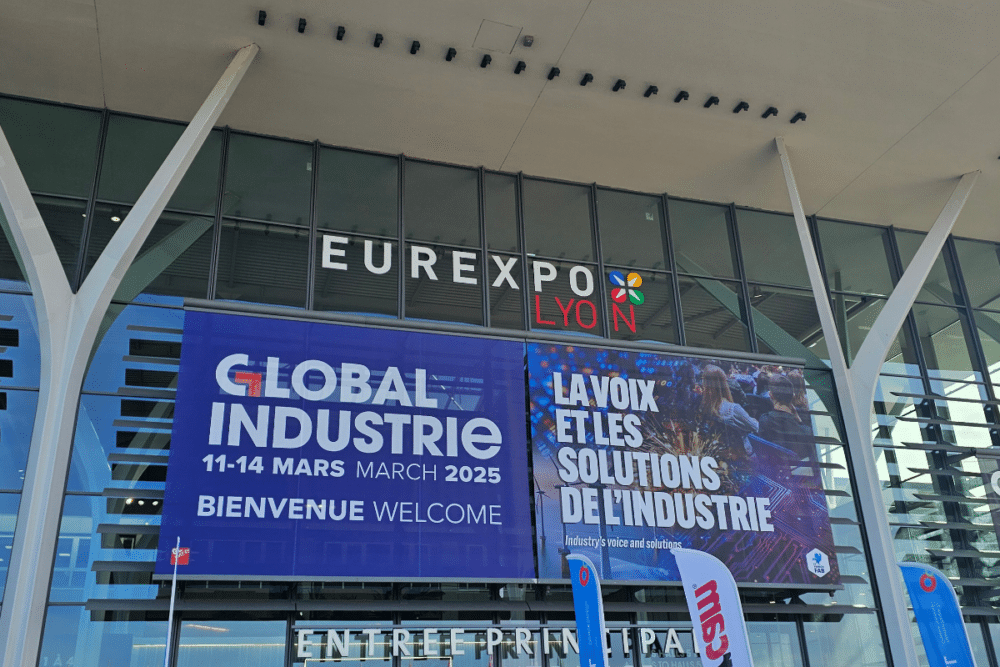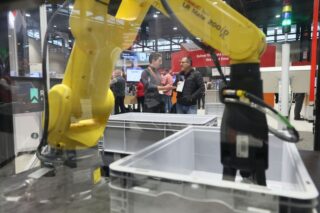The latest edition of the Global Industrie trade show, held in Lyon, France until today, is already shaping up to be a resounding success, according to the French organizer GL Events. DirectIndustry was on site.
Hicham Dhouibi contributed to this report.
A Growing Trade Show
During the press conference held on Wednesday, Sébastien Gillet, CEO of GL Events, and Julie Voyer, Director of the trade show, expressed their enthusiasm regarding the exceptional results of the first day, Tuesday, March 11:
“We achieved a +23% increase yesterday, which already sets the tone for this Lyon edition, which I believe will be magnificent,” said Sébastien Gillet.
With 2,500 exhibitors (85% of them SMEs and mid-sized companies), a 15% increase compared to the previous Lyon edition, more than 600 innovations presented, and an expected attendance of 50,000 industry professionals over four days, Global Industrie has become France’s largest factory and an unmissable event.
This dynamic was reinforced by the presence of French Prime Minister François Bayrou, the Minister of Industry Marc Ferracci, and the Minister of Labor Astrid Panosyan-Bouvet yesterday, illustrating the political recognition the French trade show:
“The political link was missing when GL Events founded Global Industrie a few years ago,” noted Sébastien Gillet.
Even though the French President has never attended the show, unlike other European industrial fairs (such as in Germany, where the Chancellor participates) or the way the French President visits the Agricultural Show.
READ ALSO
We Won’t Give Up!
This year, the challenges facing the industry are greater than ever: a slowdown in reindustrialization, factory closures, layoffs, geopolitical and trade tensions, as well as difficulties in recruiting new talent. Some industrialists present at the show even directly appealed to the ministers for help.
However, the organizers repeatedly emphasized: “We won’t give up.” In other words, they refuse to abandon the efforts made over the past ten years, ever since then-Budget Minister and now-President Emmanuel Macron made reindustrialization one of his key initiatives. This has indirectly positioned Global Industrie as the annual must-attend event for the industrial sector, akin to the Agricultural Show for the agro-food industry.
“In an uncertain context, we must show how committed and mobilized the industry is,” added Julie Voyer, Director of Global Industrie.
For Sébastien Gillet, the return of industrialists to the show despite all challenges and concerns is a positive sign:
“No industrialist has told me that their order books were empty in the first quarter. We are fortunate to operate within an ecosystem of agile companies, capable of anticipating and adapting to crises, something they have been doing for years. They didn’t wait for warnings to prepare for, for example, the energy crisis.”
Although he acknowledges that some factories are closing, he emphasizes that others are opening simultaneously:
“Many companies are reinvesting in their production lines, which generates employment. Some sectors, such as the agro-food industry, are inaugurating more factories than they are closing.”
France is not just about the automobile industry; it also includes agro-food, nuclear, and chemicals.
“The fact that we are multi-industry may be why France is resisting a little better in industry than Germany.”
However, according to France’s Ministry of Economy and Finance, there were 266 factory openings or expansions in 2024 (344 in 2023). And when considering pure site openings without expansions, the net balance turns negative (from +59 to -5 in one year). 119 sites have closed in 2024.
Between February and March, Global Industrie conducted a study in partnership with Ipsos, surveying decision-makers and business leaders about their perception of the situation. According to Julie Voyer, two major characteristics stood out:
“They are all both combative and mobilized, while also demonstrating a great deal of pragmatism in response to the uncertain situation they face daily.”
A Combative and Mobilized Industry

Combativeness and mobilization—words from the lexicon of war—were fitting for this year’s event. Due to the geopolitical climate, defense-related issues dominated discussions.
In fact, the Prime Minister’s speech reflected this perspective. François Bayrou, who attended the show last night, justified his visit by citing the geopolitical situation and took the opportunity to commend the commitment of industrialists:
“In this world, who are the front-line fighters? You, the industrialists. That’s why I wanted to come and thank you. You are not alone. We are entering demanding times, the likes of which we haven’t seen since World War II.”
Rearmament efforts require mobilizing the entire industry, from machine tool manufacturers to precision machining, metalworking, foundry, and forging. Consequently, many exhibitors discreetly positioned themselves in the defense sector. Some manufacturers have already been contacted by the French government to establish delivery schedules.
According to our industry analyst, Hicham Dhouibi:
“The urgent need for reindustrialization in defense will accelerate the digitalization, automation, and robotization of production lines. The Industry 4.0 concept, showcased in industrial fairs for the past decade, is now more relevant than ever. Expectations are high, and the technologies we have been tracking for years will play a crucial role in meeting these objectives.”
Protecting and Promoting Industry
So, for Sébastien Gillet, the focus should be on continuing to help the industry and protect French expertise:
“We are right to protect farmers because they are the heart of France. But we must not forget that the soul of France is also made up of industrialists. And I think that in the next twenty years, it will be the industry that will indirectly carry France and Europe.”
He advocates for a policy of support that matches the current and future challenges, something that industrialists, with whom we spoke, are also calling for. This support could potentially come from Europe. Several conferences specifically focused on Europe were held during the fair, discussing topics such as “The Rise of Made in Europe? Europe at Work, For European Leadership…”
“Perhaps if Europe can position itself a little more strongly between the United States and China. Even though industrialists say they don’t necessarily have full trust in Europe, they need Europe to give them confidence, at least to protect this industry…”
While Global Industrie remains primarily focused on the French market (90% of visitors and 70% of exhibitors), the issue of its development internationally, particularly within Europe, is currently under consideration, as confirmed by Julie Voyer.
Unlike other industrial fairs, particularly in Germany, Global Industrie has never spotlighted a country. Julie shared that they are working on this for future editions, with Italy potentially being a candidate.
Another ambition for this Lyon edition was to showcase a large stage and several platforms, where over 500 speakers have been alternating since Monday and will continue until tonight, defending their industry, including Patrick Martin (president of MEDEF), Philippe Varin (former CEO of Peugeot), Alexandre Mérieux (CEO of BioMérieux), and Laurent Bataille (CEO of Schneider Electric).
“We really want the voices of the industry to be heard at an event like Global Industrie,” emphasized Julie Voyer.
The fair clearly positions itself as the business partner of industrialists:
“We can sense that all the visitors here have projects and expectations. They really come to invest. They also use a trade fair as a complementary, living medium, where they can showcase their R&D developments, mobilize all their actions, and make a major communication push. And we are here to support that with you, the press.”

For Sébastien Gillet, the focus should be on continuing to help the industry and protect French expertise:
Youth and Women in Industry
The goal is not only to give a voice to prominent figures in the sector but also to the new generation of industrialists. The aim is to continue working on making the industrial sector more attractive, especially to youth and women, added Julie:
“Industry still has a huge image deficit among young people and women. Only 28.5% of women are in the industry, and I think even fewer visit the fair. It’s not yet an extraordinary number, and this will be one of the challenges for the future if we want to recruit.”
Reaching out to young people is a major challenge, and the fair has been working for several years to increase the number of young and female visitors. And we can attest to this: on the first day, we met many high school students and also noted a greater female presence on the stands and in the aisles.
Gillet confirmed:
“Fifteen years ago, there were only a thousand young people attending industrial fairs. Today, it’s between six thousand and eight thousand, which means part of the challenge is being won.”
A Focus on Logistics
For the first time, Global Industrie integrated a dedicated space for logistics, maintenance, and security, gathering 200 companies over 2,000 square meters. The connected warehouse, created in partnership with Proxinnov, offers immersive experiences in the world of logistics with robotic, digital, handling solutions, pure logistics, and exoskeletons. The goal is to provide an educational tool to talk to industrialists but also to young people, introducing them to all the logistics professions.
But this movement also has the effect of competing with French logistics fairs. Julie Voyer defends this by stating that logistics is complementary to Global Industrie’s core values, making it a natural addition:
“Global Industrie must be global. That doesn’t mean covering everything exhaustively, but it does mean at least being able to offer key sectors a representative range of solutions. Logistics came from listening to the market, listening to the field, and particularly to professional organizations.”
In the future, other topics may be added to compete with smaller, more specific fairs. What will exhibitors do?
“Today, industrialists prefer a mixed approach. They are looking for a transversal offering, especially because a significant portion of their activity – around 40% – takes place between exhibitors. But when they seek a major event dedicated to industry, they appreciate being able to find all the available solutions at a fair like Global Industrie.”
With alternating editions between Paris and Lyon, Global Industrie continues to strengthen its position as the leading industrial event in France. The next Paris edition will take place from March 30 to April 2, 2026.
A New Fair at the End of the Year
Alongside Global Industrie, GL Events is launching a new event. “48h in Tech” will be held from November 4 to 6 in Rennes (Western France) to support the digital transformation of businesses. This sort of “Viva Tech” in the regions has a dual ambition: to present technological solutions useful to small and medium-sized businesses, regardless of their industry, and to democratize the use of digital technology for society as a whole.
With an ambition to gather 300 partners and 20,000 participants, the event also aims to address recruitment challenges in the digital sector. A section will be dedicated to the attractiveness of tech professions and facilitating connections between companies and talent. For Voyer,
“The main goal remains to offer businesses concrete, innovative, and virtuous solutions, highlighting the positive impact of tech. The challenge is to address immediate and tangible needs. Tech is full of initiatives and content to share, but truly business-to-business events remain rare. That’s precisely what we master and what we want to offer to the sector’s players.”
This annual event is set to become a point of reference for the tech ecosystem in the region. The first edition will be in Brittany. Julie doesn’t rule out making this event itinerant, moving to a new location each year. See you in November!







![Image [Buying Guide] How to Choose the Right Safety Shoes?](/wp-content/uploads/sites/3/Safety-Shoes-320x213.jpg)


![Image [Buying Guide] How to Choose the Right AMR?](/wp-content/uploads/sites/3/AMR-320x213.jpg)
